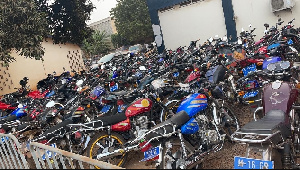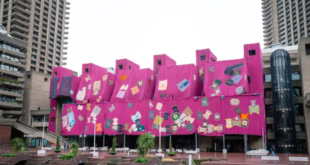Tension is high these days on the streets of Conakry, where motorcycle taxi drivers and police are embroiled in a game of cat and mouse.
Two-wheeled taxis are essential for anyone who wants to avoid the West African capital’s notorious traffic jams.
Responding to demand, many young men have committed their savings or borrowed heavily to buy a motorbike and ply informally for trade.
But police say the fast-spreading, illegal and chaotic business poses a threat to road safety and have launched a crackdown.
They have barred all motorbike taxis from Kaloum — the most lucrative area, where ministries and other government buildings are located.
Why the crackdown?
The order, announced on May 5 and effective the following day, punishes offenders with fines and even the confiscation of the motorbike itself.
Since then, motorbike taxis and police have been trying to outsmart each other — two-wheel drivers dart into Kaloum, pick up a passenger and speed away without getting pulled over.
Not infrequently, things turn physical, when Conakry’s police, who have a reputation for brutality, seize a recalcitrant driver and put the handcuffs on him.
An AFP reporter last month saw a long line of young men outside the offices of the traffic police, waiting to recover their motorbike after coughing up a fine of 200,000 Guinean francs ($20.4 / 16.7 euros) — a huge sum in one of the poorest countries in the world.
Such punishment can have a crippling effect on young men who are already struggling with poverty and massive unemployment.
“It’s forbidden, but we don’t have a job, it’s the only thing we can do,” said motorcycle taxi driver Mamadou Bachir Diallo.
“If you don’t see kids hanging out in the neighbourhoods making tea, it’s because of the motorcycles. We get by with this. And that’s why it’s unfair, there are policemen here who have motorcycle taxis in town, their little ones ride here every day and no one stops them.”
On average, driving a motorcycle taxi earns between 100,000 and 125,000 francs a month.
But just a quarter or a fifth of that — around $3 / 2.5 euros — is left after the driver pays for the bike’s loan or rental, fuel and other running costs.
“Chaos”
The motorbike taxis are widely appreciated by the public.
A trip to and from Kaloum aboard a two-wheeler is not necessarily cheap.
The price can be almost triple that of a four-wheeled taxi, if one assumes that the fare in the conventional vehicle is shared among a large number of passengers.
But where the motorbikes score is in saving time — they can nip in and out of the jams on Kaloum, located on a peninsula whose entrance is a chokepoint.
The police have a different viewpoint, saying that informal motorbike taxi drivers are a plague — and a perilous one, too.
“(They) create chaos wherever they go,” said Issa Camara, a captain with the traffic police.
“They pull over whenever they want and however they like — it’s a real problem for traffic police and other road users.”
Since the start of the year, more than 100 people have died across the country in accidents involving motorbike taxis, a senior police official said.
 Home Of Ghana News Ghana News, Entertainment And More
Home Of Ghana News Ghana News, Entertainment And More





